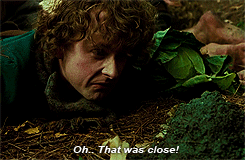 |
| (awesome artwork by alexiuss from deviantart) |
I don't think I'm alone in this, I think that we as human beings all categorize the world around us between the known and the unknown. This happens geographically, but also conceptually. In all regards, we draw that invisible line that separates the two, and we always very aware of that threshold.
Sam kind of stares at the ground, then looks up. He tells Frodo that this is it. This is as far as he's ever been from home. One more step farther, and he'll be beyond everything he's ever experienced, everything he's ever known will be behind him.
When you get to that threshold, you don't know what to expect. It's programmed into us to seek out the unknown, to try and understand it. We are naturally curious creatures, because everything we can learn about what lies around us gives us a better chance at survival. However, that curiosity is tempered by fear, for obvious reasons. Monsters under the bed, in the closest. There's a reason that children are afraid of the dark, and that's because the dark is the unknown to us, we don't know what's just beyond the reach of our night light, and everything we don't know could be a threat to our survival. Crossing the threshold into the unknown is a weighty matter, and it deserves respect.
Frodo just sort of smirks at Sam. We all know that Frodo is the hero of the story, that he's the more worldly of the two, that Sam is just the naive gardener, tagging along. Genuinely, I think that Sam is the hero of the story, but I will get into that in a later post.
After the moment of respect that Sam gives to this act, he takes a step forward. To most of us worldly folks (and Frodo) who've traveled around, we've crossed a lot of thresholds and it isn't something we really acknowledge anymore. After my drive from Washington to Georgia, I can't get much farther from home without leaving the continental United States. Knowing the exact spot in the middle of a field that is the farthest from home you've ever been is a quaint notion that just shows how endearingly mild mannered our Sam is. Although I think he's sympathetic to Sam, I think Frodo is thinking something along the same lines we are. It's just one foot step farther from home, nothing big.
Wrong.
It's right after that they (literally) run into Mary and Pippin, with Farmer Maggot right on their heels, waving sharp farming instruments menacingly. That in itself still isn't out of the ordinary, they've known Mary and Pippin a long time, and this is nothing knew. However, because of this, they fall down a cliff, they almost get injured. Worst, they almost land in a cow pie.

Close indeed, Pip. Close indeed.
Now, I may be rushing things a bit in my mind as I recall these events, but my impression is that it's almost instantaneous (after the battle for the mushrooms) that Frodo senses the approach of the ring wraith (well placed dolly zoom) and group is confronted for the first time by the supernatural and sinister forces that are hunting them.
It all started with that first step across the threshold, and adventure found them.
As we grow older, life moves faster. Things that used to be new and glamorous become part of the everyday and the exciting becomes dull.
When I was younger, at first I thought that the outside world was something strange and alien that had nothing in common with my home. As I got older, I grew more cynical and started to think I had seen it all and that there was nothing new for me to see, even though I had rarely even left Washington. Then I started to realize it was somewhere in between. Somethings are universal, but the world is a large place with a lot of strangeness, a lot of beauty, and a lot of darkness.
I think we forgot that sometimes. Sometimes we forgot that a lot. Sometimes, we are so caught up in our day to day that we forget that adventure can be just around the corner. As often as I can, I try to remember that wonder and fear I felt as a kid. Just beyond that threshold lies a lot of wonderful things, but we don't always have to go very far to find it.










